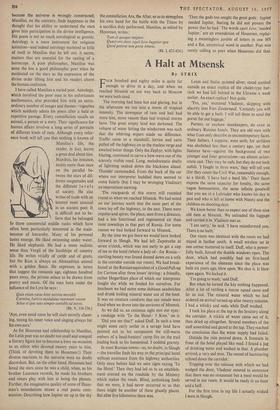A Halt at Mtsensk
By STRIX
El OUR hundred and eighty miles is quite far r enough to drive in a day, and when we reached Mtsensk on our way back to Moscow we were both tired.
The morning had been hot and glaring, but in the afternoon we ran into a storm of tropical intensity. The downpour of rain and hail had more bite, more venom than real tropical storms have. The great empty land was darkened. The volume of water hitting the windscreen was such that the whirring wipers made no difference. Traffic came to a standstill; lorries and carts pulled off the highway on to the treeless verge and awaited better things. Only the Zephyr, with lights blazing, continued to carve a bow-wave out of the scarcely visible road. Long, melodramatic shafts of lightning snaked down the blackness ahead. Thunder cannonaded. From the back of the car where our interpreter huddled there seemed to come faintly (but I may be wronging Vladimir) an intermittent mewing.
The rearguards of this storm still rumbled round us when we reached Mtsensk. We had noted on our journey south that the main part of the town lay off the highway, to the east. There were cupolas and spires; the place, seen from a distance, had a less functional and regimented air than most townships in that part of Russia. For some reason we had looked forward to Mtsensk.
By the time we got there we would have looked forward to Slough. We had left Zaporozhe at seven o'clock, which was too early to get a cup of tea in the hotel (where a lady of—for Russia— startling beauty was found dossed down on a sofa in the corridor outside our room). We had break- fasted at the Russian equivalent of a Good Pull-up for Carmen after three hours' driving : a friendly, rather Hogarthian place of which our interpreter fought shy while we fended for ourselves. For luncheon we had eaten some dubious sandwiches and drunk boiling mineral water out of the boot. It was on creature comforts that our minds were fixed when we drove into the environs of Mtsensk.
As we did so, an ominous sight met our eyes : a roadsign with 'To the Hotel : 5 Kms.' on it.
'Did you see that?' asked Duff. In such a tone might some early settler in a savage land have pointed out to his companion the still-warm embers of a head-hunters' camp fire on the trail leading back to his homestead. I nodded gravely.
In most Russian towns—as, no doubt, in Slough —the traveller finds his way to the principal hotel without assistance from the highway authorities. Only once before had we seen signs saying 'To the Hotel.' Then they had led us to an establish- ment erected on the roadside by the Ministry which makes the roads. Blind, unthinking fools that we were, it had never occurred to us that there might be another of these ghastly places. But after five kilometres there was. Lenin and Stalin. painted silver, stood sentinel outside an exact replica of the chalet-type bar- rack we had left behind in the Ukraine a week earlier. An exact replica? Not quite.
'Yes, yes,' muttered Vladimir, skipping with alacrity into Fort Zinderneuf. 'Certainly you will be able to get a bath. I will tell them to send the porter for our luggage.'
Porters, or anyhow doorkeepers, do exist in ordinary Russian hotels. They are old men with what I can only describe as uncontemporary faces. Their fathers, I suppdse, were serfs, for serfdom was abolished less than a century ago, yet their features have—against the background of two younger and freer generations—an almost aristo- cratic cast. They may be oafs, but they do not look oafish. fought in three wars,' they will tell you (for they count the Civil War, reasonably enough, as a third). 'I have had a hard life.' Their faces express the same capacity for loyalty, the same vague bemusement, the same infinite goodwill that you see in a Labrador who knows his day is past and who is left at home with Nanny and the children on shooting days.
We knew better than to expect one of these nice old men at Mtsensk. We unloaded the luggage and carried it in. Vladimir met us.
'I am sorry,' he said. 'I have misinformed you. There is no bath.'
Our room was identical with the room we had stayed in farther south. A small wireless set in one corner muttered to itself. Duff, who is power- fully built, forced the double windows open. The door, which had possibly had no first-hand experience of the elements since the place was built six years ago, blew open. We shut it. It blew open again. We locked it.
'I'm going to wash,' said Duff.
But when he turned the key nothing happened. After a lot of rattling a rescue squad came and let us out. The mineral water which we had ordered on arrival turned up after twenty minutes. I had a whisky and soda while Duff washed.
I took his place at the tap in the lavatory along the corridor. A trickle of water came out of it, then dried up altogether. Several members of the staff assembled and gazed at the tap. They reached the conclusion that the water supply had failed.
Outside the rain poured down. A fountain in front of the hotel played like mad. I found a jug of drinking water and washed in that. A plumber arrived, a very sad man. The sound of hammering echoed down the corridor.
Tripping over the suitcase with which we had wedged the door, Vladimir entered to announce that there was no restaurant but a meal would be served in our room. It would be ready in an hour and a half.
For the first time in my life I actually wished I were in Slough.






























 Previous page
Previous page